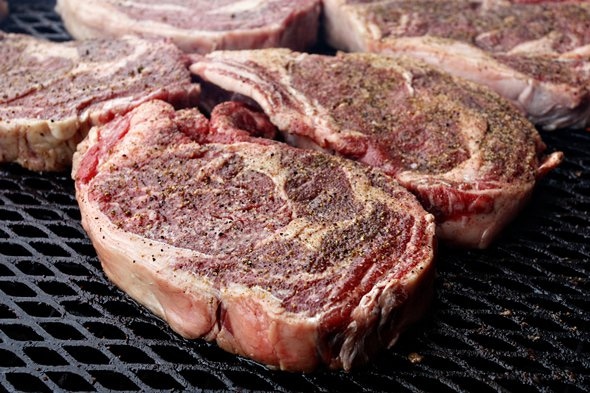As clean meats gain momentum, the beef industry is urging USDA to require labels for these fake meat products.
February 19, 2018

Last Friday, I spoke about beef industry trends at a regional cattlemen’s meeting in Sturgis, S.D. Following my presentation, a rancher asked me if I was concerned about the clean meat movement that has made headlines in recent weeks.
Am I concerned? Yes and no. My answer is complicated.
On one side, do I think consumers will flock to eat meat that has been grown in a test tube? No matter how you market the product, it will be difficult to overcome the stigma of a product that is cultured from animal tissues and created in a lab.
READ: Clean meat? It's not that simple
There’s just something inherently “wrong” about a test tube burger. Where will the flavor come from? You won’t have the benefit of the grass-fed, grain-finished product that the world knows and loves. It’s just not the same, so I have a hard time envisioning the consumer getting excited about something that isn’t “real,” for a lack of a better word.
However, I’m sure the dairy industry thought the same about almonds, soy and other nuts that are used to make milk-like substitutes. These products don’t have the taste of real dairy, and you certainly can't milk an almond; however, the consumer flocks to these products as dairy-free substitutes for their creamer in their daily coffee beverages.
On the other side, the beef industry has cause for concern. After all, Bill Gates, Tyson, Cargill and others have invested millions of dollars into either plant-based or clean meat companies in recent years. With this kind of backing, there must be some confidence in the marketplace that the test tube beef will take off, despite how unappetizing the product may sound to those of us in the business of raising real beef.
READ: On Bill Gates, clean meat & sustainability
So it makes perfect sense for organizations like the U.S. Cattlemen’s Association (USCA) and the National Cattlemen’s Beef Association (NCBA) to introduce new policy in 2018 that addresses how this clean meat should be labeled in the grocery store.
Reference NCBA’s 2018 policy book by clicking here.
Check out USCA’s petition to exclude products not derived directly from animals raised and slaughtered from the definition of “beef” and “meat” by clicking here.
I agree some policy needs to be put in place. Walk through a grocery store today, and we have a label for everything else — gluten free, all natural, organic, grass fed, GMO-free, antibiotic-free, sugar-free, cage-free, and the list goes on and on. More than a marketing claim, consumers deserve the right to know if the meat they’re eating was made in a lab or in a pasture and feedlot. If they want to pay a premium for test tube beef, that’s their prerogative; as for myself, I would like a label for this meat just so I know not to eat it when it’s offered in a restaurant or at the grocery store.
Forbes recently published an article describing how worried the beef industry is about clean meat being a direct competitor for beef sales. Michael Pellman Rowland writes, “The once unmovable beef industry is facing some real competition for the first time, and they simply don't like it. There are good reasons for them to be concerned. According to HealthFocus data, 17% of U.S. consumers eat a predominantly plant-based diet, and 60% claim to be reducing their consumption of meat-based products.
READ: Is alternative meat the wild card in consumer protein choices?
"Of those consumers cutting down on their intake of animal proteins, 55% say the change is permanent. An analyst at Rabobank, one of the world’s largest agricultural-commodity banks, published a report that said usurping just 5% market share from conventional meat would make 'clean meat' a viable product.”
Without a doubt, it will be interesting to see these power players develop a market for this clean meat. More than likely, future campaigns will be based on popular misconceptions that beef isn’t sustainable or that it’s a guilt-free product because a steer didn’t have to be slaughtered.
Perhaps consumers will fall for these lines; however, meat, not raised and harvested through the traditional methods, isn’t meat at all in my eyes. It’s an alternative protein created in a laboratory, and I think if I’m ever offered a bite, I’ll have to pass.
The opinions of Amanda Radke are not necessarily those of beefmagazine.com or Farm Progress.
About the Author(s)
You May Also Like



.png?width=300&auto=webp&quality=80&disable=upscale)
.png?width=300&auto=webp&quality=80&disable=upscale)
